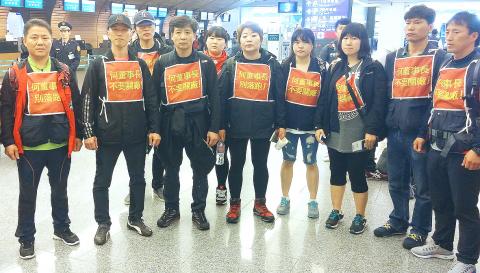A group of South Korean workers yesterday protested inside a branch of Bank SinoPac in Taipei to highlight the decision by E Ink Holdings Inc — a subsidiary of the Yuen Foong Yu Group that owns the bank — to close a Hydis plant in South Korea on Tuesday.
E Ink purchased Hydis — a plasma display manufacturer originally owned by South Korea’s Hyundai Group — in 2008 and laid off 400 employees in 2013 before deciding to close the plant this year.
E Ink said that despite the plant’s closure, it would ensure that Hydis remains in business.

Photo: Yao Chieh-hsiu, Taipei Times
The protesting workers held a press conference outside the bank, telling reporters that Yuen Foong Yu Group’s decision to close the plant when the company remained profitable was illogical.
Without giving advance notice, the protesters then entered the bank holding signs reading: “Chairman Ho, don’t run away,” and “Chairman Ho, don’t close the plant” — referring to Yuen Foong Yu chairman Ho Shou-chuan (何壽川) — and held a peaceful protest that included chanting slogans and dancing.
“We cannot accept that the Yuen Foong Yu Group arbitrarily decided to shut the company down when it is doing well financially while refusing to provide us with information from the board meetings,” the protesters said. “Our efforts here are simply to fight for our rights as workers.”
Bank staff continued to conduct business during the protest, the Chinese-language online media outlet Storm Media reported.
Police officers, speaking in Mandarin, ordered the workers to stop, before realizing that the protesters might not understand them, at which point they resorted to saying “stop” in English.
Before the protesters left the bank, the police issued two warnings to them, saying that they might have violated the Assembly and Parade Act (集會遊行法) and the Social Order Maintenance Act (社會秩序維護法).
“Our intent is not to interrupt the daily lives of Taiwanese, but to defend our own rights and to protect Hydis’ patents on fringe field switching technology,” the workers said.
Before ending the protest, the workers sang the Workers’ Fight Song (勞動者戰歌) in Mandarin, and performed a traditional Korean ritual of respect by kneeling down and placing their foreheads on the ground to thank Taiwanese activists who had come to support them.
E Ink Holdings said it was sorry to hear of the “inappropriate behavior of certain people,” adding that it has acted according to South Korean laws and urged the workers to return to South Korea to negotiate with the management.
The demonstration at the bank is not the first time that South Korean workers have protested in Taipei over the Hydis closure.
About 30 South Korean protested in front of the Ministry of Labor on Tuesday, calling on the government to facilitate talks with Yuen Foong Yu.
Six representatives from the Hydis employees’ union led a protest march to the Yeun Foong Yu offices in Taipei on Feb. 12.
The South Korean workers left for home yesterday evening.
Additional reporting by staff reporter and CNA

Chinese Nationalist Party (KMT) Chairman Eric Chu (朱立倫), spokeswoman Yang Chih-yu (楊智伃) and Legislator Hsieh Lung-chieh (謝龍介) would be summoned by police for questioning for leading an illegal assembly on Thursday evening last week, Minister of the Interior Liu Shyh-fang (劉世芳) said today. The three KMT officials led an assembly outside the Taipei City Prosecutors’ Office, a restricted area where public assembly is not allowed, protesting the questioning of several KMT staff and searches of KMT headquarters and offices in a recall petition forgery case. Chu, Yang and Hsieh are all suspected of contravening the Assembly and Parade Act (集會遊行法) by holding

PRAISE: Japanese visitor Takashi Kubota said the Taiwanese temple architecture images showcased in the AI Art Gallery were the most impressive displays he saw Taiwan does not have an official pavilion at the World Expo in Osaka, Japan, because of its diplomatic predicament, but the government-backed Tech World pavilion is drawing interest with its unique recreations of works by Taiwanese artists. The pavilion features an artificial intelligence (AI)-based art gallery showcasing works of famous Taiwanese artists from the Japanese colonial period using innovative technologies. Among its main simulated displays are Eastern gouache paintings by Chen Chin (陳進), Lin Yu-shan (林玉山) and Kuo Hsueh-hu (郭雪湖), who were the three young Taiwanese painters selected for the East Asian Painting exhibition in 1927. Gouache is a water-based

Taiwan would welcome the return of Honduras as a diplomatic ally if its next president decides to make such a move, Minister of Foreign Affairs Lin Chia-lung (林佳龍) said yesterday. “Of course, we would welcome Honduras if they want to restore diplomatic ties with Taiwan after their elections,” Lin said at a meeting of the legislature’s Foreign Affairs and National Defense Committee, when asked to comment on statements made by two of the three Honduran presidential candidates during the presidential campaign in the Central American country. Taiwan is paying close attention to the region as a whole in the wake of a

OFF-TARGET: More than 30,000 participants were expected to take part in the Games next month, but only 6,550 foreign and 19,400 Taiwanese athletes have registered Taipei city councilors yesterday blasted the organizers of next month’s World Masters Games over sudden timetable and venue changes, which they said have caused thousands of participants to back out of the international sporting event, among other organizational issues. They also cited visa delays and political interference by China as reasons many foreign athletes are requesting refunds for the event, to be held from May 17 to 30. Jointly organized by the Taipei and New Taipei City governments, the games have been rocked by numerous controversies since preparations began in 2020. Taipei City Councilor Lin Yen-feng (林延鳳) said yesterday that new measures by